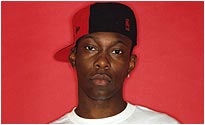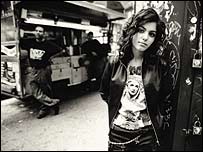Grime: locked out

Fuller version of my article appearing in Socialist Worker magazine:
"I am a problem for Anthony Blair" (Dizzee Rascal, 2004)
Every generation has its youth movement, whether it's the psychedelic 60s, punk in the 70s, new wave in the 80s and dance music in the 90s. Grime is a current social phenomenon in London and predominantly elsewhere in the UK. A whole generation of young people from a part of society normally invisible to the mainstream unless labelled as "hoodies" or "gangs", have aspirations to be MCs, producers and DJs.
First to clarify, grime isn't a British version of US rap - a small UK hip hop scene has been running since the early 1990s but has failed to ignite because essentially it is a poor copy. Grime on the other hand comes from somewhere different because it has evolved from the rave, jungle and garage scenes, utilising the same infrastructure, personnel and context. Like it's wrong to describe Jamaican dancehall as a version of US hip hop (it emanated reggae), it is also wrong to view Grime as the same. Also, like jungle and garage before it, grime is essentially a London thing, though its influence is now spreading throughout the UK.
Despite all this, you won't see many 'grime' labelled nights if you scan the Time Out listings, because there aren't many nights running. The scene's live circuit is suppressed by Police and local authorities and has been since the early 00s.
 While still known as ‘garage’, its main proponents - So Solid Crew - were targeted as principal enemies to the state by Ministers, tabloids and so on. A crew of 20 or so predominantly black males from a Battersea estate, rapping over harshly minimal beats reaching the upper echelons of the charts were not seen as wholesome entertainment by the powers that be, and certain misdemeanours involving their members, such as the carrying of firearms, supported their case. "Idiots like the So Solid Crew are glorifying gun culture and violence," said minister Kim Howells following the deaths of two Birmingham teenagers from gunfire in 2003.
While still known as ‘garage’, its main proponents - So Solid Crew - were targeted as principal enemies to the state by Ministers, tabloids and so on. A crew of 20 or so predominantly black males from a Battersea estate, rapping over harshly minimal beats reaching the upper echelons of the charts were not seen as wholesome entertainment by the powers that be, and certain misdemeanours involving their members, such as the carrying of firearms, supported their case. "Idiots like the So Solid Crew are glorifying gun culture and violence," said minister Kim Howells following the deaths of two Birmingham teenagers from gunfire in 2003.This state-sponsored anti-garage lobby had enough clout to effectively shut down the live scene, ward off major label interest and dampen interest from the music media. Radio 1 lost interest, HMV stopped stocking the records, and music critics, fine with tales of gangster lives in US rap, were seemingly less keen to hear about the same issues played out on their doorstep.
’Grime’ was borne out of the suppression of the garage scene (though a strictly non-MC version of garage continues to prosper in clubs). Pirate radio, which was always a important conduit for jungle and garage, became even more important for grime when the other outlets closed. With the pressure to succeed being less about populating the dancefloor, the sounds became more experimental and MC lyrics became more serious, occasionally nihilistic and combined street slang with patois and cockney. Pay As You Go Kartel signified the mood with their underground hit "Terrible" – “now we're going on terrible, I've had enough that's it, now we're going on terrible”.
With less reliance on nightclubs, the scene also attracted a younger audience many of whom were brought up on a staple of US rap, Jamaican dancehall and UK garage. Self-made DVDs became an important currency in the scene - rappers, producers and DJs, deprived on a place on music television were given a platform to provide a visual accompaniment to their narratives. New underground stars have emerged in the last 3 to 4 years, Dizzee Rascal, Wiley, Kano and D Double. Some parts of the media have started taken an interest again in their perennial search for the next big thing. But the glass ceiling is still in place, in particular there is still very little evidence of a re-emerging live circuit. Eskimo Dance organised by central-figure Wiley was an extremely popular grime night, but after only a short run it has been pushed outside of London's M25 orbital to towns like Watford, Hemel and Chelmsford because of difficulties in securing permissions and licensees from authorities in London. In October 2005, Kano, a new major label signing from the grime scene, had his gig at the Scala in King's Cross cancelled following safety risk concerns from Camden Council and the Met Police. Similarly, MoBo award-winner, Sway was banned from the Jazz Cafe, in north London, after a fight which didn't involve the artist.
Indeed to an outsider, the live grime night would appear to have a certain level of rowdiness, but in this sense it is not too dissimilar to punk. Crews of young black and white teenagers leap around with their hoods up calling for the DJ to rewind a tune. Like punk though at its heartbeat is a positive instrument of disaffected youngsters organising themselves to question the way things are.
Perhaps it is this bit which is unpalatable in need of what could only be described as censorship? Police are openly advising promoters to remove "dangerous" acts from their line-ups. My own attempt to organise a mild community street festival in Hackney last August resulted in a police warning me it would be permitted so long as there would be "no garage, no rap, no reggae, no r'n'b" - not even an obscured subtext about who they didn't want to see there (presumably healthy music staples like death metal were deemed fine). Another example of grime's prohibition was the nightclub ban of the 'grime' anthem “pow” by Lethal Bizzle (a top ten chart hit) by police in Essex in 2004 because of the energetic reaction it caused on the dancefloor. Even pirate radio, grime's trusted media has received a clampdown by authorities, with over 40 transmitters confiscated near the end of 2005 on the very dubious basis that they interfere with emergency vehicle radio signals.
Major labels have cherry-picked talent (such as Dizzee Rascal) and in doing so have attempted through their marketing to de-contextualise and 'clean-up' their 'product' for mass consumption. This is to be expected I guess (de-rigueur for the ‘mainstream’), but it has further alienated grime's core audience.
 Meanwhile mainstream music in the UK is become wilfully dominated by middle and upper class offspring in retro tribute bands - where the bad boy antics of the likes of Pete Doherty are hardly feared or suppressed, rather celebrated in the great tradition of rock and roll. Then there’s the tedious minstrels like James Blunt (staunch Thatcherite, ex-squaddie) or Katie Melua for example - showing how the music industry has become gentrified into bland theraputic soundtracks.
Meanwhile mainstream music in the UK is become wilfully dominated by middle and upper class offspring in retro tribute bands - where the bad boy antics of the likes of Pete Doherty are hardly feared or suppressed, rather celebrated in the great tradition of rock and roll. Then there’s the tedious minstrels like James Blunt (staunch Thatcherite, ex-squaddie) or Katie Melua for example - showing how the music industry has become gentrified into bland theraputic soundtracks.Music providing a voice for the disaffected, alienated and angry is not being tolerated at the moment, possibly because that anger, alienation and disaffection is a little too real. Without doubt, grime lyrics can be unpleasant, homophobic, misogynist and celebratory of gun culture, but it's so easy for the authorities/media to blame the plight and alienation of urban communities on means of expression and reflection (music) rather than examining what their own role might be in this. Tony Blair wants a little respect with his latest policy agenda, while Dizzee tells us 'you people are going to respect me if it kills you'.

1 Comments:
Hello Blogger, You have a perfect blog! I have a horse related site. Please visit it if you get any time.
Best Regards,
Luis
Post a Comment
<< Home